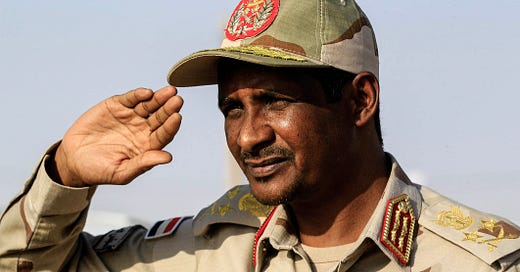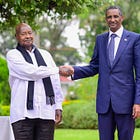Hemedti: The most powerful man in Sudan
Mohamed Hamdan Dagalo has turned his obscure paramilitary group into one of the most dangerous and brutal fighting forces on the continent. The people of Sudan are paying the price.
Tom Rhodes and Ayin Network
We don’t know much about the early life of Mohamed Hamdan Dagalo, probably the most powerful – and dangerous – man in Sudan. We know that he was born in 1973, somewhere in Darfur, to a family of camel herders. We know that his uncle, Juma Dagalo, was the chief of the elite Awlad Mansour clan within the Mahariya Rizeigat, a Darfuri Arab tribe. And we know that he spent his early years herding camels across the wadis of northern Darfur and eastern Chad, leaving formal education in the third grade.
And then, suddenly, his life changed.
According to sources within the northern Rizeigat tribal confederation, the formative moment in the young boy’s life came when his caravan was attacked by armed gunmen. Details of the incident cannot be independently confirmed, but some reports suggest that up to 60 of his family and kinsmen were killed that day, and their camels looted. This was Dagalo’s first, brutal introduction to the war in Darfur, in which pastoralist, tribal communities such as his were locked into a conflict over land and resources with sedentary farmers.
Dagalo has been at war ever since.
As a teenager, Dagalo saw the former dictator Omar al-Bashir rise to power and develop an expansive array of ethnically-organised militias to quell rebellions and maintain power.
The most significant of these was the Janjaweed – a militia group drawn from Arab tribes of Darfur and eastern Chad, including the Mahariya Rizeigat. Bashir used the Janjaweed to halt the advance of rebel groups in Darfur, and they were devastatingly effective – playing a leading role in perpetrating the Darfur Genocide.
Dagalo was an enthusiastic and ruthless participant, rising quickly to become a Janjaweed commander. From the very beginning of his military career, he was reported to have a pronounced proclivity for brutality.
Some of this is documented.
On 23 November 2004, Hemedti led an attack against Adwa village in South Darfur State, in which 126 people were killed. His Janjaweed fighters worked with the state, using a deadly formula that would be repeated all over Darfur. Army warplanes would bomb indiscriminately from above while the Janjaweed would kill and loot from the ground.
“Men were immediately shot, while women were kept in detention for two days,” wrote award-winning journalist Al-Haj Warrag, describing the attack. “Young girls were raped by the attackers in the presence of their mothers.”
A deal with the devil
It was atrocities such as these that brought Dagalo to the attention of President Bashir, who was himself no stranger to war crimes. In 2013, the two men made a deal. Bashir created a new, extremely powerful paramilitary group – the Rapid Support Forces, or RSF – under the auspices of his notorious intelligence service.
He appointed Dagalo to lead it.
Over the next few years, the RSF quelled resistance from Darfur’s numerous rebel groups. Dagalo’s force was so successful that Bashir started to refer to him as “Hamayti” which means “my protector”. This morphed into Hemedti, the nickname by which Dagalo is generally known today.
“Bashir created and developed the RSF to proof his regime against coups,” said Suliman Baldo, the founding director of the Sudan Transparency and Policy Tracker. “When they proved more effective than the army as a counter-insurgency force, both Bashir and the army leadership were happy to have a proxy force doing their work for them.”
Bashir’s creation of the RSF was also a way to protect him from former allies, according to Sudan researcher Joshua Craze. Hemedti and the RSF were used to guard Bashir against increasingly disgruntled Janjaweed leaders in the periphery such as Musa Hilal, and the ambitions of his former security chief Salah Abdalla “Gosh” in central command.
It worked, for a time. But ultimately, the person that Bashir most needed protection from was Hemedti himself.
Paying the price
To pay for the new paramilitary force, Bashir gave Hemedti control of lucrative gold mining concessions along with trade opportunities in livestock and grains. There was no state oversight, and the heavily-armed RSF used its muscle to guarantee enormous profits. Leaked documents show that the RSF enjoyed financial autonomy from the state, with bank accounts in its own name.
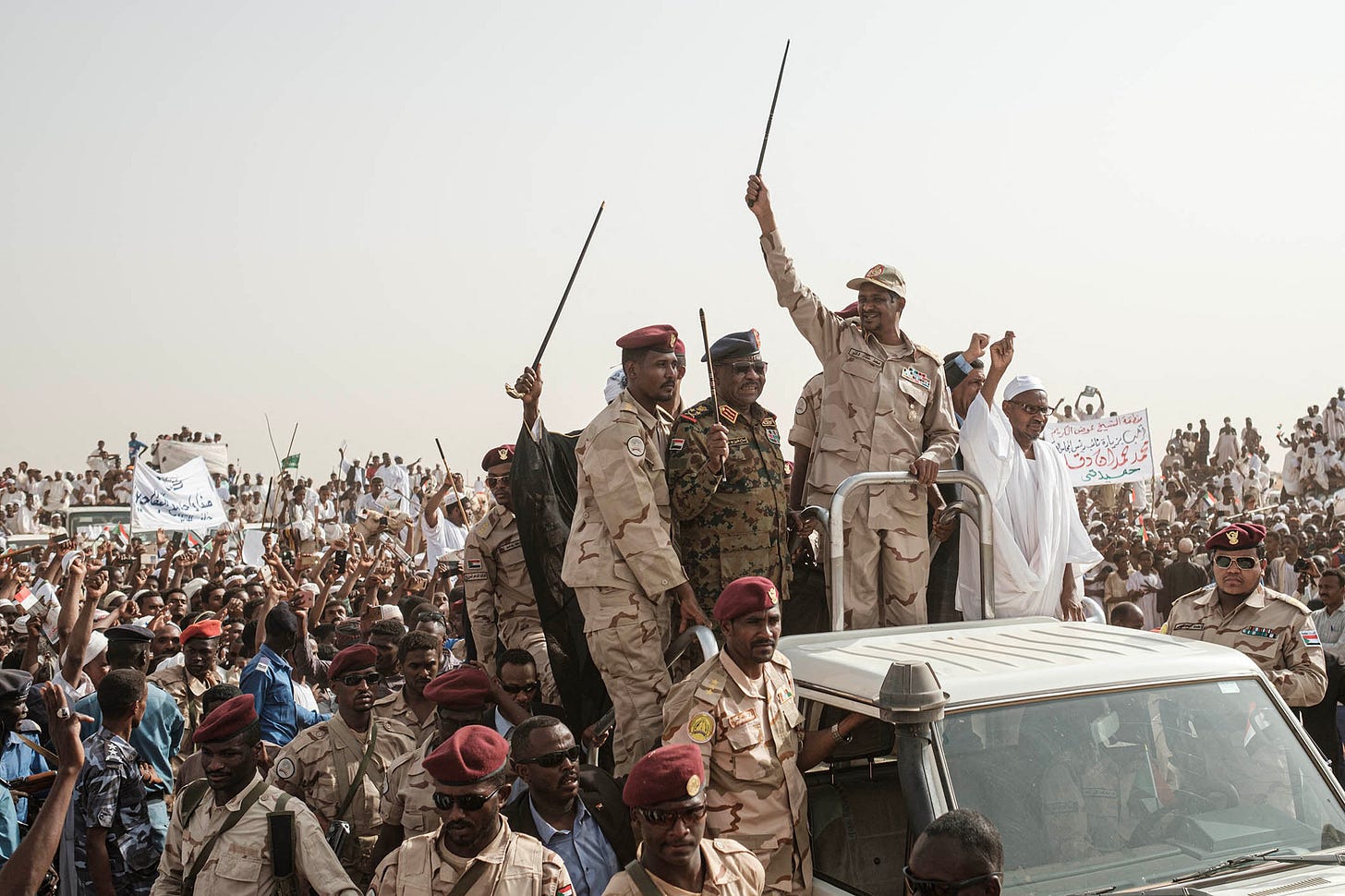
Hemedti and his family became enormously wealthy in this period, setting up the Al-Junaid Multi Activities Company to profit from the RSF’s effective monopoly on gold trading. This company was placed under economic sanctions last year by the United States.
The RSF also took on some significant international security contracts. These were a source of foreign exchange – and, later, would help account for Hemedti’s diplomatic influence.
From 2015 Hemedti sent his forces to fight Iran-aligned Houthi rebels in Yemen, allying with Saudi Arabia and the United Arab Emirates. A year later, the European Union supported an RSF-led migration control programme – allowing Hemedti to ply his soldiers with combat experience, training, and payment, all courtesy of European taxpayers. More RSF forces were dispatched to Libya to fight alongside General Khalifa Haftar, currying further favour from the UAE and, at the time, Egypt.
In 2017, the Rapid Support Forces Act was passed, allowing the RSF to operate as a “semi-autonomous force” whose leadership was directly appointed and managed by the president of the republic.
Now the RSF could collect salary from government payroll while remaining somewhat independent from any state discipline, including economic ventures.
According to long-time Sudan researcher Alex de Waal, writing for the BBC in 2019, the RSF’s strength by this time “had grown tenfold”. With 70,000 men and over 10,000 armed pick-up trucks, “the RSF became Sudan’s de-facto infantry”. Despite this growth, the command structure remained much the same: mostly Arab tribesmen from Darfur under the control of the Dagalo family.
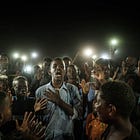
As the war rages on, the resistance committees are keeping Sudan’s revolution alive – but only just
“The Rapid Support Forces have turned into a private transnational mercenary company, a gold extraction and trading company, and an armed cultivator for Hemedti’s commercial empire,” researcher Abu Dhar Ali told Ayin. “But all of this was not done based on the genius of Hemedti, but rather by whoever wants to employ him.”
No end in sight
In late 2018, demonstrations against Bashir’s autocratic rule broke out across Sudan. Despite violence and intimidation, they grew in strength and breadth, until a million people were marching on the army headquarters in Khartoum. Bashir’s allies realised he had to go. Hemedti turned on his one-time benefactor.
The European Union supported an RSF-led migration control programme – allowing Hemedti to ply his soldiers with combat experience, training, and payment, all courtesy of European taxpayers.
Bashir was deposed in April, and replaced by an interim government: an uneasy, ineffective coalition of civilian leaders, army leaders and Hemedti’s RSF. This lasted just two years before the army and the RSF conspired to remove the civilians from power in an October 2021 coup. And then, in April 2023, they tarted fighting among themselves.
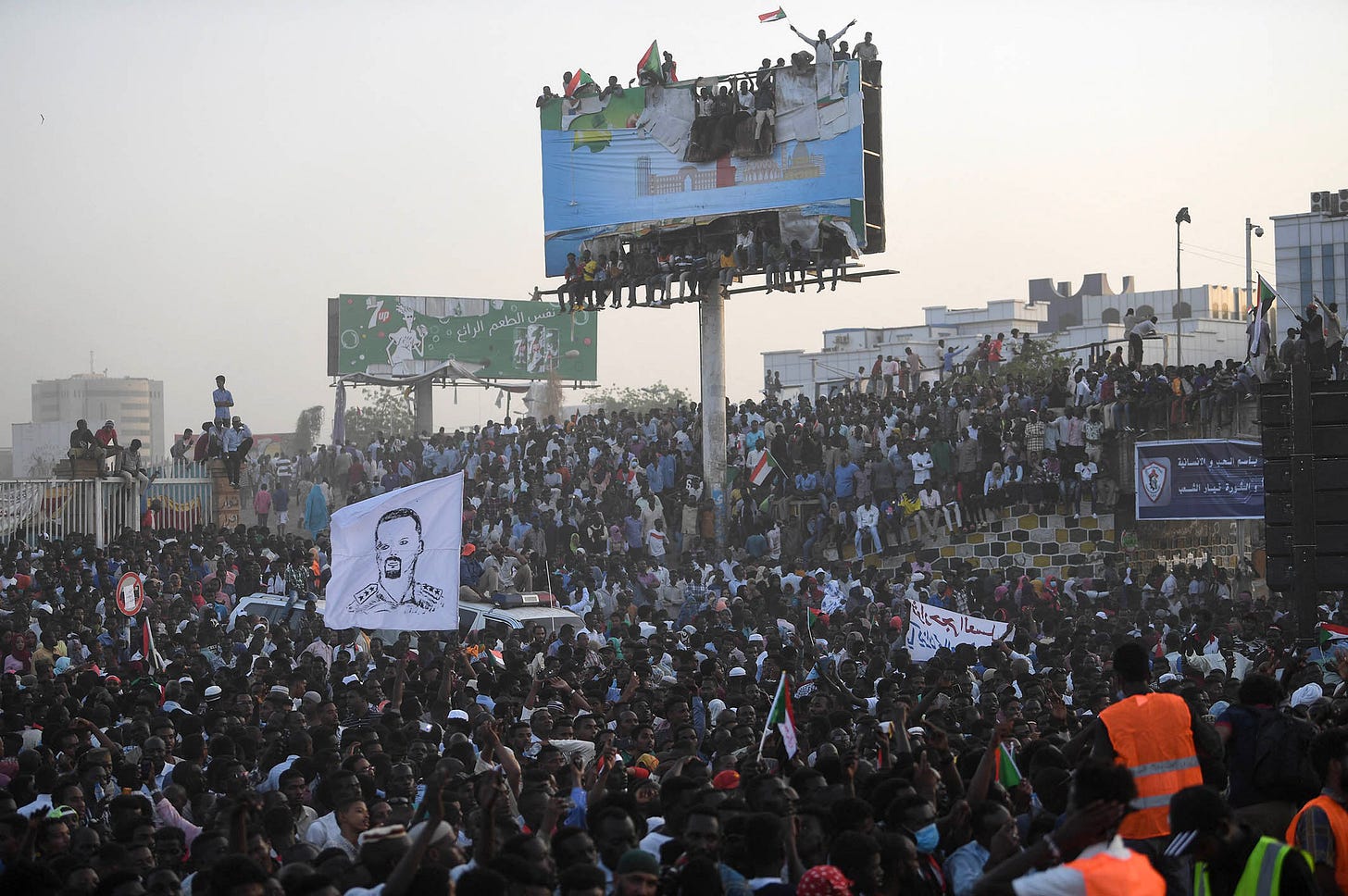
The RSF and the Sudanese army engaged in battles across Sudan, beginning a devastating civil war that is nowhere near being resolved. The conflict has led to the displacement of roughly eight million people – that’s 15% of the country’s population – and has left nearly 18-million people facing severe food shortages. The indiscriminate bombings, mass looting and assaults on civilians from both warring parties have led many to believe the conflict is not so much between two armed factions but a war against the Sudanese people.
Meanwhile, Hemedti has sought to reinvent himself as a statesman – touring African and Gulf capitals on diplomatic charm offensives, even as the forces under his command commit atrocity after atrocity. His links with the UAE have proved especially significant: the Emirates have been implicated in smuggling arms to the RSF, helping it to achieve a measure of military ascendancy over the Sudanese Armed Forces (the UAE denies these allegations).
“He [Hemedti] is seeking legitimacy abroad that the RSF cannot earn domestically because of the conduct of its soldiers,” said analyst Baldo. This strategy is working, judging by the warm reception Hemedti received recently in Pretoria, Kampala, Nairobi and Addis Ababa.
Meanwhile, the war goes on. Neither side appears strong enough to win, at least not any time soon. All we know for sure is that the Sudanese people keep losing – and Hemedti, “my protector”, is a large part of the reason why.

